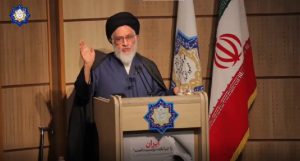
Group of Thought: The following is an analysis of the doctor Mahmoud Qaqi al -Qalam Faculty Member of Shahid Beheshti University On the precedence of the free economy and the internationalization of economic as the most central step in reforming the managerial, political and social structures of a country. In other words, the rapid views of al -Qalam are a guidance for the development of the country. The author argues that the state of economics is the root of all the problems and barriers to development, including lack of transparency, inefficiency and weakening of nationalism.
The author believes that the most focused cause of a country’s internationalization is its economic structure. Any government that takes full responsibility for production, distribution, income and employment (such as the Soviet Union) eliminates the necessity of internationalization. In such a structure, there is no motivation to pay attention to quality, price, customer satisfaction or efficiency. In his view, the internationalization of the economy has decisive consequences beyond production and livelihoods, including structural transparency, the realization of meritocracy and systematic management, and the fight against corruption and capital escape, strengthen the real nationalism, balance political thought, and reform infrastructure and public culture. The author considers the source of current confusion in the country’s public debate (such as clubs) as “theoretical confusion” in determining the precedence and the conduct of corrective steps; While most of the world’s successful countries (such as China, Mexico, Indonesia) have overcome this confusion. Because these countries, with a definitive decision, make their economy non -governmental and support private sector activity on the world stage with financial and policy tools. According to this professor, the main precondition for these countries’ success is that in practice they have said that “we share power with the interior and share wealth with foreigners”. Therefore, the current confusion is due to the lack of human experience in management and conversations. This article, published on Dr. Fast al -Qalam’s channel, reads below:
****
The economic structure; The root of the internationalization of a country
The most focused cause of an international country is its economic structure. As soon as the government decided to be responsible for producing, distributing, earning money, creating employment and living with him, it has eliminated the need for internationalization of its economy and country. The obvious example of this situation is the Soviet Union. On the contrary, when a state of production, consumption, income, and employment to the private sector, it is “forced” to expose its economic system to the international economy.
The private sector competition; Efficiency and quality
The private sector is sensitive to price, sales, raw material optimization, competition, service quality, time, efficiency and market status. The private sector has a structure that does not allow the employee to spend breakfast at 9am or to treat the customer or deliver an inappropriate product. Every moment and every behavior is important. In addition to the market and domestic competition, the private sector is “forced” to be efficient and competitive as soon as it enters foreign markets. If the automotive industry was selling in four other countries and competed with Hyundai and Toyota, could it continue to produce poor quality cars? Siemens operates in nine countries.
In the industrial circles of the world, the accuracy, timing, quality and planning of Siemens is all known. Whether in the domestic and international scene, if it is not a competitive structure, what is the reason for a company to care about quality? When there is no competition, what is the matter that the customer is satisfied? The South Korean car industry has been working on the world of the US, Japanese and German car industry for twenty years. Türkiye Airlines, Hoteling, Restaurant Industry and Shopping Centers have competed with France and Italy for decades to place their country in the first five countries.
Internationalization; Transparency, meritocracy, and system management precondition
The internationalization of a country’s economy has a very decisive consequence not only in production and livelihoods, but also in the personality and behavior of a community: transparency of laws, regulations, policies, and bylaws. As soon as it becomes an international company, it must clarify its operations and workflows because it loses its stock market as soon as the smallest fraud, cunning, accounting, and confidence, trust, status and value in the market.
Competition and market also lead to integrity, not necessarily by ethical foundations but by trusting, attracting customers and with the aim of increasing sales and market sales. Organizational transparency results in people’s behavioral transparency. The economy of a country cannot become international, but in a state of ambiguity, the management of parallel, bureaucratic organizations, playing with statistics and changing policy -making.
As soon as the economy becomes international, it is “forced” to be transparent. Interestingly, the Vietnam government is centralized, authoritarian and communist, but its economy is international, transparent and competitive. Malaysia, Singapore, Türkiye, Indonesia and Mexico are also in the context. The comparative inference of these countries proves the principle that democracy is not necessarily the precedent of economic growth and development.
All over the world, it is apparently only in one country, the primacy and delay in economic development and political development. The rest of the sovereignty has generally “decided” to base the economy and internationalization of the economy. For decades, the country has been discussing “meritocracy” for decades. When 5 % of a country’s economy is with the state institution, the realization of “meritocracy” in the social system is close to the impossible. For decades, the country has been discussing how to move from “individual management to systematic management”.
Only with the nongovernmental economy and the internationalization of the economy, skills and systems are prioritized. The country has been discussing “efficiency and combating financial and administrative corruption” for decades. If the banking system and the banking system are precise and operational, the private bank will never lend € 5 million to the individual without collateral, and when it lends it has so much supervisory mechanisms that it will complete the projects for up to three years. It has been a concern for “capital escape” for decades. It is the inefficiency and government interference that informs unhealthy economy and “instability” and provides the basis for capital escape.
The internationalization of economics and the emergence of real nationalism
Another important thing that happens to the internationalization of the economy is that people are interested in working and working in their country because there is the space and structure needed to make a reasonable income and life. The most reliable supporters of nationalism and interest in home are among the medium -sized and private sector. In such societies, foreign political influence is at least in itself. This class needs its country to live better. The Israelis in the 1980s had come to the conclusion that due to the poverty of society and the Middle East government, with the same motivation (ie, financial), people could hire people and do not need to resort to future. Poverty severely weakens the commitment to the soil and the country.
The people of Malaysia, Indonesia, Vietnam and Singapore do not need to think about migrating to another country because they have the opportunity to grow, compete and improve their lives in their homeland. For the emergence of nationalism, the middle class and the private sector that mainly hold the economy is a vital necessity. Nationalism is not an abstract and emotional issue, but a real and quantitative thing. Political thought is also balanced in parallel to the growth of soil by internationalization of the economy, as people generally realize that their lives are in competition at home and abroad, and the harsh words lose most of their customers, as radicalism is at least in the UAE and Türkiye.
The rent is not an extremist to minimize itself. Why do a significant percentage of different strata in Russia defend and support the oligarchy without having the slightest belief in their hearts? Because they are financially dependent on it and they have a government rent. Iraq has a democratic constitution but, according to the Iraqi authorities, has a corrupt system of administrative and financial because the economy is a state, and having a position in the country means access to rent and facilities and the possibility of abuse, corruption and political opportunism.
Healthy policy is in the face of a non -governmental economy. Why has you always wanted to work in the United States? Because in the private sector, it is at least five times higher than salaries and benefits. It is not unreasonable that over 5 % of the country’s labor force works for the private sector. There is also a private sector in Egypt, but it breathes in the corridors of the government, has no independence, and is in the service of the sovereignty called Parasite Capitalism.
The impact of internationalization on infrastructure and culture (public skills)
Again, the benefits of the internationalization of the economy is that the construction structure of a country because it is exposed to the world is reformed and efficient. Roads, airports, ports, hotels and environmental protection are important. A country with an international economy cannot have polluted air. In a country with an international economy, people are “forced” to learn foreign languages. There are nationality in Dubai and the UAE has five times the population of its own foreign citizen. A wide range of customs, cultures and languages work together. People learn that different nations, cultures, and readings must be listened to, respected, and learned. The internationalization of the economy leads to the reform of public relations skills, and coexistence is commonplace while cultural pluralism.
Theoretical confusion in the development and practical strategy of successful countries
In the discussion of the clubs, which sometimes lasts 2 to 4 hours, a kind of theoretical confusion comes. What is the problem? Where to start? Is the law problem or culture? Who to pay attention to? Consultation? Did he advise? Is the problem of the government or the people? Is it history or society? Is the Mongol invasion to blame or the Ottoman attack? Why is America not listening to? Is it a negotiating team or that team? Is there a problem with intellectuals or political activists? Is this government to blame or that government? Structure to be modified? Yafkar? Or people? And what is the order? Of course, this theoretical confusion has existed since the constitution.
In other words, there is no consensus on determining the priority and steps that must be taken to reform the affairs. In other words, we do not have the “consensus development theory”. In the discussions of the clubs, the experiences of other countries are rarely exemplified. What did Brazil do that is ahead of Russia in GDP? Why is Indonesia progressing at the speed of light? What is the UAE pattern? Why is Singapore the most transparent banking system in the world? How did China act in only five years that 5 % of what the American people consume is Chinese? How does Mexico say “no” in many cases and at the same time trade about $ 5 billion?
Russia is the first enemy of the United States to conflict and confront it in the public domain, but Mexico has both good relations with Moscow and did not condemn Russia in the Ukrainian war. Mexico turned China into its second business partner to get economic and political privileges from the United States. It seems that these countries and their citizens are not in theoretical confusion because, as the first and most decisive step in development theory, they have made their economy nongovernmental and support their private sector activity inside and in the world with financial, administrative and policy -making tools.
Also, by restricting the government to legislation and oversight, they have prevented embezzlement, lies, cunning, fraud, hoarding, opportunism and capital outflow. Car manufacturers are now in the queue to allow Mexico to issue their soil production permit. Of course, the general countries that have passed through theoretical confusion have accepted a prerequisite: “With the interior, they share power and wealth with foreigners.” In year 2, the Chinese HNA group, with about $ 1.5 billion, bought 2 percent of the Hilton Hotel Group and would Chinese two out of ten board. Since year 5, the Chinese have bought US companies for about $ 5 billion. At the same time, it is not clear how much this prerequisite to the political culture of the Middle East that values control rather than management. Confusion begins that human experience is almost closed in dialogue and in management.
1
منبع: www.khabaronline.ir




